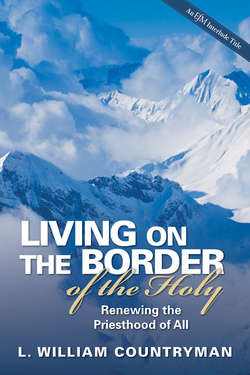Living on the Border of the Holy

Описание книги
"The first thing to say in our exploration of priesthood is this: priesthood is a fundamental and inescapable part of being human. All human beings, knowingly or not, minister as priests to one another. All of us, knowingly or not, receive priestly ministrations from one another. Unless we begin here, we are not likely to understand the confusions and uncertainties and opportunities we have been encountering in the life of the church itself in recent years. We shall be in danger, in fact, of creating makeshift solutions to half-understood problems, easy answers to misleading questions, temporary bandages for institutions that need to be healed from the ground up." – L. William Countryman
There is a lot of tension in churches today about whose ministry is primary-that of the laity or of the clergy. L. William Countryman argues that we can only resolve that problem by seeing that we are all priests simply by virtue of being human and living, as we all do, on the mysterious and uncertain border with the Holy. Living on the Border of the Holy offers a way of understanding the priesthood of the whole people of God and the priesthood of the ordained in complementary ways by showing how both are rooted in the fundamental priestly nature of human life. After an exploration of the ministry of both laity and ordained, Countryman concludes by examining the implications of this view of priesthood for churches and for educating those studying for ordination.
"What a blessing to have at hand William Countryman's book, which, by disentangling ordination from real ministry, does an extraordinary job of clarifying what we mean when we speak of the church, of religion, and of God. I wish every self-identified 'person of faith' could read this remarkable, thought-provoking book." -Bruce Bawer, author of Stealing Jesus: How Fundamentalism Betrays Christianity
L. William Countryman is an Episcopal priest, professor of New Testament at the Church Divinity School of the Pacific in Berkeley, California, and author of Forgiven and Forgiving, The Language of Ordination, Biblical Authority or Biblical Tyranny? and other titles.
Оглавление
L. William Countryman. Living on the Border of the Holy
LIVING ON THE BORDER of the Holy
Contents
Preface
1. The Priesthood of Humanity
2. The Priesthood of Religion
3. The Priesthood of Christ
4. The Priesthood of the Christian People
5. The Two Priesthoods in the Church
6. Problems about Priesthood
7. An Ordained Ministry in and for the Fundamental Priesthood
8. Being Priests
Acknowledgments
Bibliography
Отрывок из книги
Praise for Living on Border of the Holy
“You may not think of yourself as a priest and you may be in some doubt about what it means when others use the label. But by the time you have finished reading Bill Countryman’s work you will have discovered that you are one. You will have learned something about the joys and perils of serving as one. And you will have captured a glimpse of what it means to live ‘on the border of the Holy.’
.....
To become a true priest of the LIFE-GIVING HOLY requires a certain loving detachment. We have to enter the border country and live among its secrets without having our eye fixed too much on how we can make use of them. We are there for love and communion and enjoyment, not for use. We must often learn to let the HOLY set the question as well as give the answer. We must accept the gift of insight as sufficient reward. If we enter the border country to control it or organize it, or to have our prejudices confirmed or to make some gain, we risk having our humanity warped or destroyed. And we shall usually harm others in the process.
If we enter the borderlands “knowing” too much in advance, if we only want answers to our prefabricated questions, or escape from an everyday reality that we are tired of grappling with, or proof of our own righteousness and wisdom, or a chance to satisfy our own grandiosity by taking possession of great mysteries, we cannot grow in truth—except by having our expectations shattered. If we are distracted by self-interested motives, we cannot be fully present to TRUTH; we cannot be attentive long enough to grow in it. TRUTH, after all, can be humiliating; it can deprive us of our most treasured lies and plunge us right back into the problem we were trying to escape. But TRUTH is also what grounds us and our everyday world. What is not true is not of GOD, is not, finally, HOLY or real. To live safely in the border country, we need to cultivate a quiet openness to the unexpected and to let go our hopes of ever controlling GOD. If we use the priestly arcana to gratify personal ambition or to protect us from whatever we fear, they will be distorted and become malignant. If we use them to satisfy the passions of a group, they will become demonic.
.....
